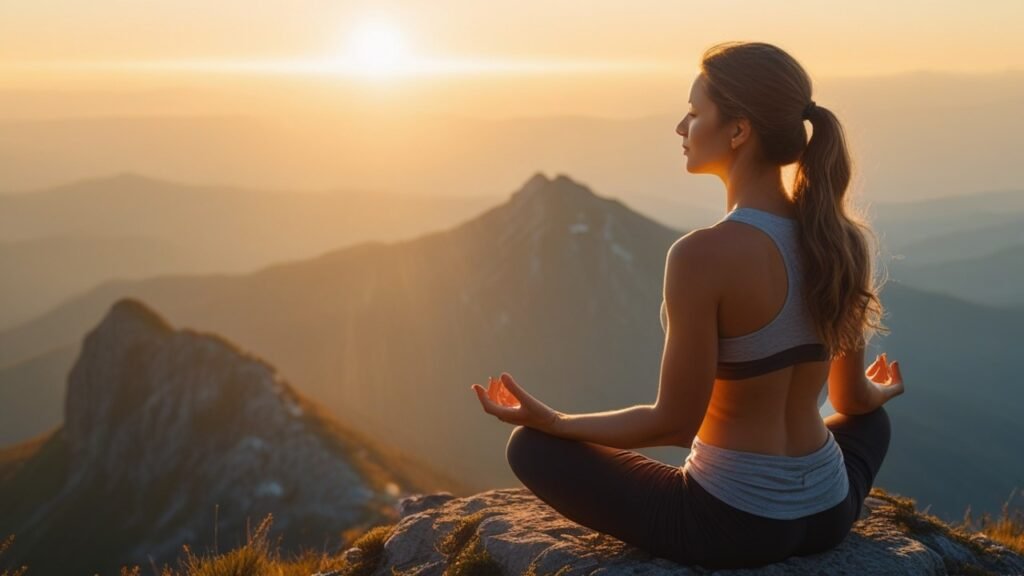How to Find Spirituality without Religion

When you hear the word “spirituality”, most likely, the first thing that comes to mind is religion.
It’s often thought that the only way to be spiritual is to be religious, and that the only way to be religious is to believe in God.
But that’s not true.
It is absolutely possible to find and explore your spirituality without religion. In fact, spirituality and religion are two separate things. While they can coexist, they don’t need to.
To be spiritual means to be connected to something greater than yourself, to be connected to the universe, and to be connected to the divine.
This connection can exist within or outside of a religious context. It can be found through formal religious practices, nature, meditation, art, and more.
In this post, we’re going to explore how to find spirituality without religion.
We’ll discuss what spirituality is, how it’s different from religion, and how to get in touch with your spiritual side.
There are many ways to find spirituality that do not involve religion. Here are some examples that you can try to see what resonates with you.
- Meditation
- Nature walks
- Journaling
- Yoga
- Cooking
- Reading
- Acts of kindness
- Art
- Music
- Gardening
- Volunteering
- Learning
- Traveling
- Spending time with loved ones
- Breathing exercises
- Prayer
- What is Spirituality?
- Spirituality vs. Religion
- How to Find Spirituality without Religion
- 1. Start with the basics
- 2. Search for a spiritual connection
- 3. Ask yourself what you believe
- 4. Read up on spirituality
- 5. Try meditation
- 6. Think about what you want out of life
- 7. Ask for guidance
- 8. Find a spiritual practice that works for you
- 9. Be open to new ideas
- 10. Talk to others about their spiritual beliefs
- How to Practice Spirituality without Religion
- Non Religious Spiritual Practices
- Conclusion
- FAQ
What is Spirituality?
Spirituality is a broad concept with room for many perspectives. In general, it includes a sense of connection to something bigger than ourselves and typically involves a search for meaning in life.

As such, it is a universal human experience, something that transcends cultural boundaries, inviting individuals to explore their inner selves and seek personal truths without the confines of belief.
Embrace this journey as a way to foster inner peace and understanding.
By engaging in various activities that cultivate mindfulness and presence, you can deepen your connection to yourself and the world, ultimately enriching your spiritual journey beyond religious confines.
Each of these activities can serve as a gateway, inviting introspection and fostering a deeper understanding of your existence while enhancing your connection to the universe and those around you.
Spirituality vs. Religion
The term spirituality is often used interchangeably with religion, but they are two different things. Religion is a formal set of beliefs, rituals, and practices that are often associated with a specific faith, church, or organization.
Spirituality, on the other hand, is a personal journey that may or may not include religious beliefs.
You can be spiritual without being religious or you can be religious and spiritual. You can also be religious and not spiritual, or neither.
It all depends on your personal beliefs and how you choose to live your life. For example, you may consider yourself an atheist or agnostic, but still feel a sense of connection to something greater than yourself.
That feeling of connection is often described as spirituality.
How to Find Spirituality without Religion
If you’ve been struggling to find a spiritual connection that feels right to you, you’re not alone.
In a world where religion is often considered the default, it can be hard to find your own path to spirituality.
The good news is that there are many ways to connect with your spiritual side without subscribing to any particular religious beliefs.
Finding your own spiritual path can be a deeply personal and rewarding journey. It can help you find a sense of purpose, connect with others, and even improve your mental and physical health.
In this guide, we’ll explore how to find spirituality without religion, what spirituality is, how it differs from religion, and how you can find your own spiritual connection.
1. Start with the basics
Spirituality is about connecting with yourself and the world around you. This can look like many different things, like practicing yoga, meditating, or spending time in nature.
If you’re not sure where to start, think about what you enjoy and what makes you feel good. Then, try to find a spiritual practice that aligns with those feelings.
2. Search for a spiritual connection
Spirituality doesn’t have to be about getting in touch with the divine or praying to a higher power. It can be anything that helps you discover and connect with the deepest parts of yourself and others.

By doing so, you can find a sense of purpose and connection to the world around you. This can be just as powerful as seeking a connection to the divine.
3. Ask yourself what you believe
What are your beliefs about the world? Do you believe in a higher power? Do you believe that everything happens for a reason? Do you believe that we are all connected in some way?
Take some time to sit with these questions and write out your answers. Your beliefs about the world and the people around you can help you to define your spirituality.
4. Read up on spirituality
There are many books, articles, and other resources that can help you learn more about spirituality. For example, you might want to read up on different types of spiritual practices, such as meditation, yoga, or mindfulness.
You can also find books and articles that explore the connection between spirituality and health, or that provide tips on how to live a more spiritual life. There are so many resources available, you’re sure to find something that resonates with you.
5. Try meditation
Meditation is a practice that can be done in many different ways. It’s a practice of mindfulness, of being present, and of calming the mind.

Meditation can be done in a quiet room or in a busy, noisy place. It can be done sitting, lying down, or even walking. You can meditate with music or in silence.
The point is to practice being present and to calm your mind. This can help you connect to your inner self or to the universe, or it can simply help you find peace and relaxation.
6. Think about what you want out of life
Asking the big questions is a key part of spirituality. What is the meaning of life? What is your purpose? What do you want to accomplish in this life?
When you think about the things you want out of life, you may find that there are some things that you want that you never thought of before. Maybe you want to travel more, or you want to spend more time with your family. Maybe you want to make a difference in the world, or you want to learn something new.
Whatever it is that you want out of life, thinking about it can help you to come up with a plan to make your dreams a reality.
7. Ask for guidance
This could be from a higher power, a spirit guide, or your own higher self. I like to ask for guidance when I shuffle my tarot cards or meditate. But you can do this in prayer, in yoga, or in any other spiritual practice.
If you don’t have a spiritual practice, you can even ask for guidance while you take a walk or go about your day. Just like meditation, asking for guidance can help you connect with the universe and get clear on what you need.
8. Find a spiritual practice that works for you
Spirituality without religion can take many forms. You may find that meditation, yoga, or mindfulness are practices that help you connect with your spiritual self. You might also find that you need to try a few practices before you find the one that resonates with you.
If you’re not sure where to start, consider trying a few different practices and seeing how you feel. You may find that you’re more drawn to some than others, and that’s okay. The most important thing is to find a practice that works for you.
9. Be open to new ideas
This is one of the most important aspects of spirituality. When you’re open to new ideas, you’re more likely to grow and expand your mind. You may even find that you connect with new people and develop new interests.
Being open to new ideas is also a great way to avoid getting stuck in a rut. This can help you to lead a more interesting and fulfilling life.
You can be open to new ideas by seeking out new experiences, reading books and articles on a variety of topics, and talking to people with different perspectives.
10. Talk to others about their spiritual beliefs
If you’re curious about spirituality, you’re not alone. Many people seek out their own spiritual beliefs and practices. Talk to people you know and trust about their spiritual beliefs. You may find that you have some things in common or that you can learn from their experiences.
If you’re not comfortable talking to people you know about their spiritual beliefs, you can also talk to a spiritual leader or counselor. Many people are happy to share their experiences and can help you find your own spiritual path.
How to Practice Spirituality without Religion
Practicing spirituality without religion involves exploring various activities that foster personal growth and connection.
Begin by engaging in mindfulness practices like meditation or yoga, which cultivate awareness of your inner self.
Nature walks can deepen your appreciation for the world around you, while journaling allows for introspection and expression of thoughts and feelings.
Embrace creative outlets such as art or music, which can serve as powerful tools for understanding your emotions.
Additionally, acts of kindness and volunteering can enhance your connection to others, fostering a sense of community and purpose as you navigate your spiritual journey independently of religious frameworks.
Engaging in spirituality without religion invites a rich tapestry of experiences that can illuminate your path.
Explore diverse practices, such as mindful breathing or dance, which not only promote well-being but also forge deeper connections within yourself and with others.
Attending workshops or retreats centered on personal growth can introduce you to like-minded individuals, creating a supportive community.
Additionally, consider integrating daily rituals that resonate with you, this could be lighting a candle during reflection or simply pausing to appreciate the beauty around you.
Ultimately, the journey is uniquely yours, embrace it with curiosity and openness.
Non Religious Spiritual Practices
Non-religious spiritual practices offer individuals diverse pathways to foster personal growth and connection.
Engaging in meditation promotes mindfulness and self-awareness, helping to quiet the mind and center one’s thoughts.
Nature walks invite a deeper appreciation for the environment, allowing individuals to feel grounded and connected to the earth.
Journaling serves as a powerful outlet for reflection, enabling exploration of emotions and thoughts.
Creative expressions, such as painting or playing music, can also provide insight into one’s inner world.
Additionally, community service and acts of kindness cultivate a sense of belonging and purpose, enriching the spiritual journey beyond traditional religious frameworks.
Incorporating mindfulness into your daily routine can significantly enhance this spiritual exploration.
Begin with simple breathing exercises, which anchor you to the present moment, or adopt a practice like yoga that harmonizes body and mind.
Furthermore, consider exploring various philosophies or spiritual teachings from diverse cultures, this exposure can provide new perspectives and insights.
Engaging with others in discussions about their spiritual practices encourages reflection on your own beliefs and experiences.
Ultimately, the journey towards spirituality without religion is about crafting a personal path that resonates deeply with you while fostering growth, understanding, and connection.
Conclusion
Spirituality isn’t about what you believe, it’s about how you live. Now that you know how to find spirituality without religion, you can start living a life of purpose. Engaging in conversations with others about their spiritual journeys can illuminate your own path, offering diverse perspectives and insights that enrich your understanding of spirituality beyond traditional frameworks.
Exploring various spiritual practices opens doors to new insights, allowing you to cultivate a deeper understanding of yourself and forge connections with the world around you.
FAQ
Can you be spiritual without religion?
Yes, you can absolutely be spiritual without adhering to any religious framework. Spirituality often emphasizes personal connection, exploration, and growth, independent of organized beliefs or rituals typically associated with religion.
How do I figure out my spirituality?
To figure out your spirituality, reflect on your beliefs, values, and experiences. Engage in activities that inspire introspection, such as journaling, meditating, or spending time in nature, allowing deeper connections to emerge.
How do I develop myself spiritually?
To develop yourself spiritually, explore practices like meditation, yoga, or journaling. Engage in nature, seek meaningful connections, and reflect on your beliefs to deepen your understanding and foster personal growth.
How do I find my divine purpose?
To uncover your divine purpose, begin with self-reflection. Ask yourself what brings you joy, what values resonate deeply, and how you envision contributing to the world. Explore diverse experiences that inspire growth.



